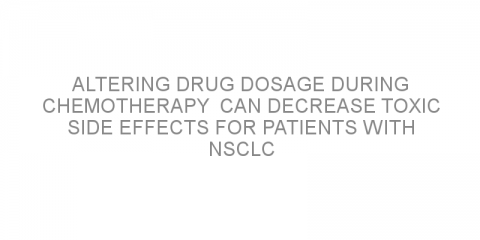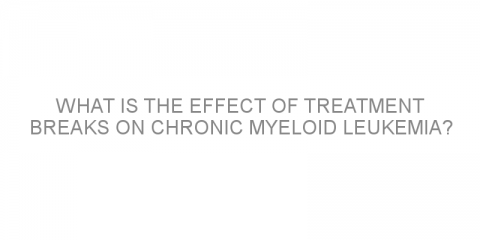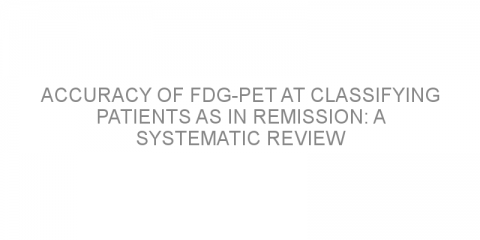Transcript Please remember the opinions expressed on Patient Power are not necessarily the views of our sponsors, contributors, partners or Patient Power. Our discussions are not a substitute for seeking medical advice or care from your own doctor. That’s how you’ll get care that’s most appropriate for you. Janet...
Read MoreCurrent treatment status-Undergoing active treatment Posts on Medivizor
Altering drug dosage during chemotherapy can decrease toxic side effects for patients with NSCLC
In a nutshell This trial examined whether altering the recommended dose of chemotherapy drugs during treatment was beneficial to patients. This trial concluded that altering doses of paclitaxel (Taxol) during chemotherapy could be beneficial to reduce neuropathy in patients with advanced non-small-cell lung cancer. Some...
Read MoreRobotic rectal cancer surgery offers better recovery of the urogenital organs
In a nutshell This study compared the functional outcomes of the urinary and sexual organs after a robotic (RRS) or laparoscopic rectal cancer surgery (LRS). Researchers suggested that the robotic rectal surgery offers better post-surgery recovery of these organs. Some background Rectal cancer surgery is associated with a high risk of urinary and...
Read MoreThe role of dexamethasone mouthwash in preventing everolimus-related stomatitis in women with breast cancer
In a nutshell This study investigated the use of dexamethasone (Ozurdex) mouthwash for preventing stomatitis in patients with breast cancer(BC). The use of dexamethasone oral solution was found to significantly reduce the incidence and severity of stomatitis. Some background Everolimus (Afinitor) and exemestane (Aromasin) are mTOR inhibitors...
Read MoreCan early response to treatment with tyrosine kinase inhibitors predict long-term outcomes?
In a nutshell This study examined the effect of early treatment response to different tyrosine kinase inhibitors on long-term outcomes in patients with chronic myeloid leukemia (CML). Researchers reported that early treatment response is predictive of long-term outcomes across all tyrosine kinase inhibitors studied. Some background CML is a...
Read MoreWhat is the effect of treatment breaks on chronic myeloid leukemia?
In a nutshell This study examined the effect of dose reductions or interruptions on the effectiveness of dasatinib (Sprycel) and nilotinib (Tasigna). The authors concluded that dose reductions or treatment breaks did not affect response or survival rates in chronic myeloid leukemia (CML) patients. Some background The tyrosine kinase inhibitor...
Read MoreDoes radiotherapy benefit older patients with triple-negative breast cancer
In a nutshell This study investigated the effects of radiotherapy (RT) in older patients with triple-negative breast cancer (TNBC). RT was found to be associated with better survival outcomes for both younger and older patients. Some background TNBC is a form of breast cancer which tests negative for estrogen/ progesterone receptors and human...
Read MoreStopping treatment following response in CML
In a nutshell This article reviewed the safety of stopping tyrosine kinase inhibitor (TKI) therapy in chronic myeloid leukemia patients who have responded to treatment. This review concluded that TKI therapy can lead to a functional cure, and retreatment is possible if the disease recurs. Some background TKI therapy, such as imatinib (Gleevac), is...
Read MoreAccuracy of FDG-PET at classifying patients as in remission: A systematic review
In a nutshell This review looked at the ability of F-luoro-2-deoxy-D-glucose positron emission topography (FDG-PET) to predict complete disease remission in patients with Hodgkin lymphoma who have completed first-line treatment. The authors suggested that FDG-PET may not be fully accurate at predicting remission in patients who have completed...
Read MoreTargeted therapies for childhood ALL and AML
In a nutshell This article reviewed targeted therapies under investigation for childhood acute lymphoblastic leukemia (ALL) and acute myeloid leukemia (AML). Some background Treatment options have improved survival rates in childhood leukemia. However, up to 20% of ALL patients will relapse. Relapse rates are also high in AML. New treatments are...
Read MoreTreatment options for younger AML patients
In a nutshell This article reviewed the options for induction therapy (therapy to induce remission) in younger patients (less than age 60) with acute myeloid leukemia (AML). Some background AML occurs due to genetic changes (mutations) to stem cells (immature blood cells). These genetic changes can cause AML cells to become resistant to treatment...
Read MoreIncidence of ovarian function recovery in women over 40 with chemotherapy induced amenorrhea
In a nutshell This study investigated ovarian function recovery (OFR) after chemotherapy-induced amenorrhea (absence of menstruation) in women aged 40-49 after 2 years of aromatase inhibitor (AI) therapy. The study concluded that a large number of women with chemotherapy-induced amenorrhea recover ovarian function during AI therapy. Some...
Read More












